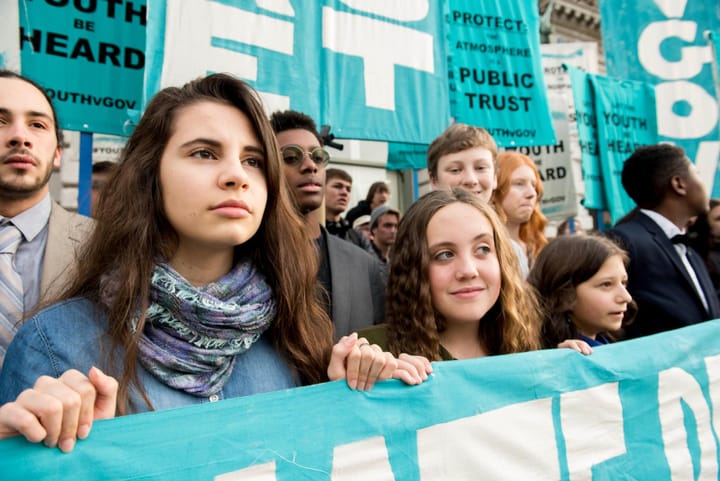Youth Climate Case Against US Government Should Go To Trial, Court Rules (Again)

A federal trial court judge in Oregon has rejected the US government’s latest attempts to quash the constitutional climate case Juliana v. United States, once again allowing the youth-led civil rights lawsuit to advance to trial.
In a ruling issued on December 29, 2023, US District Judge Ann Aiken denied the government defendants’ motions to dismiss and to further stall the litigation as well as their request to bring another pre-trail appeal. Aiken’s ruling also orders the parties to arrange a pre-trial conference to discuss next steps including scheduling a trial date. The case had been previously slated to start trial five years ago on October 29, 2018, but the government’s extraordinary and repeated obstruction tactics derailed the trial and ultimately resulted in a federal appeals court ordering the case be dismissed in January 2020.
First filed in 2015 by the nonprofit law firm Our Children’s Trust, representing 21 young people from across the country, the lawsuit challenges the US government’s promotion and perpetuation of a fossil fuel-based energy system that is contributing to the climate emergency, which disproportionately burdens youth as climate impacts worsen over time. The government’s conduct is unconstitutional, the case contends, endangering youth plaintiffs’ fundamental rights under the Fifth Amendment to the US Constitution, as well as amounting to reckless destruction of life-sustaining natural resources in violation of the public trust doctrine.
While the case had originally sought both a court declaration of these violations and a court order for the government to develop a science-based “climate recovery plan” to help reverse atmospheric carbon dioxide concentrations back down to a limit of 350 parts per million, a Ninth Circuit Court of Appeals panel held that the latter remedy was outside the scope of the courts’ authority to impose. In a 2-1 decision the panel decided the case should be terminated, and it sent the case back to the trial court with instructions to dismiss. But in a June 1, 2023 order Judge Aiken revived the litigation in granting plaintiffs’ request to move forward under a revised version of their complaint, which eliminated the ask for the court to order government action. With the case now seeking only declaratory relief, Aiken noted that the question of determining whether constitutional rights have been violated “is squarely within the purview of the judiciary.”
“Defendants appear to misunderstand the function of the Court acting within its prescribed authority to declare what the law is—it is not the Court which will perform ‘a sweeping policy review,’ it is defendants,” Aiken wrote in her December 29 opinion. The 49-page filing recognizes the climate crisis as “the great emergency of our time” and restates Aiken’s finding expressed in her initial denial of the government’s bid to dismiss in 2016 – “the right to stable climate system that can sustain human life is fundamental to a free and ordered society.”
Attorneys for the youth plaintiffs say they are pushing to have the case scheduled for trial this year. “We’re working with the Department of Justice to set up a prompt scheduling conference, and we hope to get a trial date in 2024,” Phil Gregory, Of Counsel with Our Children’s Trust, said via phone.
“This path to justice has been over eight long years in coming,” Julia Olson, chief legal counsel for Our Children’s Trust, said in a press release. “Finally, in 2024, the Juliana plaintiffs will have their long-awaited trial and the federal government’s fossil fuel energy system will be measured and judged by the fundamental constitutional rights of these youth.”
The case could still face roadblocks on the path to trial, however.
“There are hurdles [at this stage],” said Michael Gerrard, founder and faculty director of the Sabin Center for Climate Change Law at Columbia Law School. He said he expects the Department of Justice will again turn to the Ninth Circuit court in a bid to delay or prevent trial. “I think there’s going to be a strong impulse to try to block this,” Gerrard said. If the Ninth Circuit were to reject the government’s petition, the US Supreme Court could still stall or block trial at the government’s request. That is effectively what happened last time around in 2018, when the Supreme Court issued a temporary stay or pause on the litigation just 10 days before the start of trial.
This is also a federal election year in the US, and the presidential election is shaping up to be a consequential contest in which the continuation of constitutional democracy itself is likely at stake. That adds another layer of urgency for the Juliana plaintiffs’ constitutional climate case to proceed to trial in 2024.
“We want to follow Judge Aiken’s order and get a prompt trial date,” Gregory said. “We’ll see how the Biden administration’s Department of Justice handles this.”


